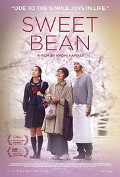
Japan 2015
Directed by
Naomi Kawasa
113 minutes
Rated G
Reviewed by
Sharon Hurst


An
Synopsis: Sentaro (Masatoshi Nagase) manages a small street stall producing pancakes known as dorayaki. Schoolgirls, including one lonely outsider, Wakana (Kyara Uchida), frequent the place. One day an old woman, Tokue (Kirin Kiki), comes in asking for a job volunteering to work for a pittance. Sentaro fobs her off, but after tasting her gift of home-made sweet bean paste, known as “an”, he decides to give it a go. The lives of Tokue, Sentaro and Wakana progressively become intertwined, but a shadow from Tokue’s past emerges, affecting the business, but deepening the friendships.
I’m a sucker for films of this nature, but it’s not just me – An has won many accolades at various festivals along with awards for acting and direction. It’s the sort of small-scale story that rarely makes it to mainstream cinemas but that’s a big shame, because it is gently uplifting and very, very beautiful.
The film’s appeal stems from several sources starting with that most emblematic Japanese icon, the cherry blossom. The Japanese are obsessed with their sakura trees celebrating them joyously each year. They are symbolic of the ephemerality of life, blooming as they do for a window of only a couple of weeks. Tokue is seen in some of the film’s most touching moments revelling in the blossom, talking to the trees which, as well as everything else in the natural world, for her have their own stories to tell us. This quintessentially Japanese animistic philosophy is carried over to Tokue’s method of preparing her bean paste. She tells Sentaro how one must listen to the steam, let the beans get accustomed to the sugar and talk lovingly to the beans over their long cooking period.
When we meet Sentaro he is a broody, unsmiling and impatient man, with tragedy in his past. Wakana comes from a troubled home with an uncaring mother who doesn’t want her daughter to continue her education. She even makes her daughter get rid of her pet canary. But it is Tokue who has the most baggage from her past – early in life she was put in an institution for people with a fearsome disease (I won’t reveal the details) and this has kept her away from the real world for much of her life. So the three people’s meeting is serendipitous Each has something to give to and learn from the other.
Although the little pancakes and their sweet filling are a central motif of the story, An is less about them as a gourmet delicacy and more about what the process of making them represents. It is also about being in the moment and making the most of every small thing that life brings your way – something expressed on customers’ delighted faces when they taste “the real thing” in the dorayaki filling.
This timeless insight is contrasted in the character of the owner of the little shop (Miyoko Asada) who comes to announce forthcoming renovations bringing with her, a careless punk, her teenage nephew an evident symbol of the modern youth of Japan.
Want something different?





